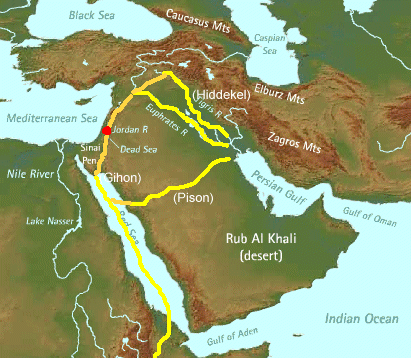On Evaluating Merits of Revised Chronologies
[To Damien Mackey],
....
It's a joy to find your work. About seven months ago, I became very interested in chronological revisionism, first concerning the exodus from Egypt and conquest of Canaan, but then more radical revisionism so that the Egyptian civilization (and others) might postdate the Flood (around 2274 BC in my estimation). I've read the work of David Rohl and Peter James, who appear to be "soft revisionists"- reworking the chronology so that the exodus and conquest make good sense, and I'm starting to read Donovan Courville right now. The difficulty is that I, as a non-expert, have virtually no way of evaluating the merits of these respective chronologies, especially where they diverge (concerning whether the Old Kingdom ought to undergo a radical revision and concerning the dates of the Amarna period on).
Do you have any recommendations as to where I should begin, and what work I should read first?
Thanks much,
....
Damien Mackey Replies:
....
I can well appreciate how perplexing you must find the whole thing to be. There is the conventional system of which we need to have some grasp, and then there are all of those quite different revised systems, none fully agreeing.
Peter James and David Rohl have been important, inasmuch as they have corrected some of the mistakes made by Velikovsky (who was a pioneer). Peter James's "Centuries of Darkness" is a classic, and ought to be read. But I would agree with you that their actual revisions are "soft", floating precariously halfway between Velikovsky and convention.
Courville is very good, but rather heavy going. He, too, was a pioneer and stands in need of some modifications. But he will set you on a good path.
There are some anchors that I personally would insist upon, and you will find these within my 5-part series:
"Bible Bending Pharaonic Egypt".
bringing Egyptian history into line with the Bible.
E.g. Dr. John Osgood's stratigraphy for the period of Abram, in
https://www.academia.edu/10913875/Bible_Bending_Pharaonic_Egypt._Part_
And also, there, the Middle Bronze I people as the Exodus Israelites.
Courville has missed the compelling link between Joseph of Egypt and Imhotep.
In: https://www.academia.edu/11096667/Bible_Bending_Pharaonic_Egypt._Part_
Velikovsky's thesis that the Kingdom of Israel and Egypt's 18th dynasty were contemporaneous, with Hatshepsut as the Queen of Sheba and Thutmose III as the biblical Shishak.
In: https://www.academia.edu/11358194/Bible_Bending_Pharaonic_Egypt._Part_
Velikovsky's vitally important connections of El Amarna's kings of Amurru with biblical kings of Syria.
Peter James's terrific correcting of El Amarna's Abdi hiba (Velikovsky's king Jehoshaphat) to king Jehoram instead.
In: https://www.academia.edu/11399649/Bible_Bending_Pharaonic_Egypt._Part_
One thing is sure, the conventional view of Ramses II as a contemporary of Moses is hopelessly wrong.
In: https://www.academia.edu/11645243/Bible_Bending_Pharaonic_Egypt._Part_
Much of this pertains to my own work, locating the drama of the Book of Judith at the time of king Hezekiah of Judah.
I hope that this will be of some use to you ....
My best regards
Damien.
Peter James and David Rohl have been important, inasmuch as they have corrected some of the mistakes made by Velikovsky (who was a pioneer). Peter James's "Centuries of Darkness" is a classic, and ought to be read. But I would agree with you that their actual revisions are "soft", floating precariously halfway between Velikovsky and convention.
Courville is very good, but rather heavy going. He, too, was a pioneer and stands in need of some modifications. But he will set you on a good path.
There are some anchors that I personally would insist upon, and you will find these within my 5-part series:
"Bible Bending Pharaonic Egypt".
bringing Egyptian history into line with the Bible.
E.g. Dr. John Osgood's stratigraphy for the period of Abram, in
https://www.academia.edu/10913875/Bible_Bending_Pharaonic_Egypt._Part_
And also, there, the Middle Bronze I people as the Exodus Israelites.
Courville has missed the compelling link between Joseph of Egypt and Imhotep.
In: https://www.academia.edu/11096667/Bible_Bending_Pharaonic_Egypt._Part_
Velikovsky's thesis that the Kingdom of Israel and Egypt's 18th dynasty were contemporaneous, with Hatshepsut as the Queen of Sheba and Thutmose III as the biblical Shishak.
In: https://www.academia.edu/11358194/Bible_Bending_Pharaonic_Egypt._Part_
Velikovsky's vitally important connections of El Amarna's kings of Amurru with biblical kings of Syria.
Peter James's terrific correcting of El Amarna's Abdi hiba (Velikovsky's king Jehoshaphat) to king Jehoram instead.
In: https://www.academia.edu/11399649/Bible_Bending_Pharaonic_Egypt._Part_
One thing is sure, the conventional view of Ramses II as a contemporary of Moses is hopelessly wrong.
In: https://www.academia.edu/11645243/Bible_Bending_Pharaonic_Egypt._Part_
Much of this pertains to my own work, locating the drama of the Book of Judith at the time of king Hezekiah of Judah.
I hope that this will be of some use to you ....
My best regards
Damien.

Comments